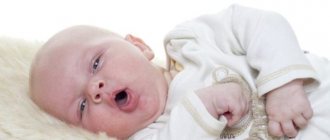What is a cough
Coughing is an unconditioned human reflex that allows certain volumes of air to be quickly expelled from the lungs. Even completely healthy children and adults can cough to clear the airways of dust and germs.
However, the situation when a child develops or intensifies a cough at night causes considerable concern among parents, since it is impossible to say for sure what caused this condition: a disease of the throat, lungs, bronchi, a cold or an allergic reaction. But in any case, a night cough is a signal that the child has health problems. This means that a mandatory consultation with a pediatrician is required.
How to relieve a child’s cough at night with drugs from the pharmacy
It is easy to remove the irritant in an allergic reaction. But what if coughing attacks at night are caused by a virus or bacteria? The pharmacy offers a huge list of drugs for this case. Before purchasing, you should understand exactly how to relieve a cough in a child of dry and wet type. This is an important criterion, since thinning medications should not be given during productive bronchospasm.
How to relieve an attack is better to ask a doctor. Many pediatricians allow Sinekod to be given at night, but the drug should not be abused. The medicine does not solve the health problem; it acts on the nerve center, suppressing reflexes.
Before using the medication, you need to find out the causes of bronchospasm. Only after this are drugs selected that can calm the attacks that interfere with rest. Babies under one year old should not be given medications that suppress reflexes. The instructions should always be read, even if the appointment is made in a clinic.
In a child, attacks of dry cough can still be eliminated with the following medications:
- ACC - is prescribed if attacks of dry cough in a child continue for a long time. The drug can also be taken during a spasm with phlegm. During an attack, you do not need to give it; the medicine is taken 3 hours before bedtime;
- Plantain syrup – helps facilitate the removal of sputum. Wet spasm is well treated with Dr. Theiss and Gerbion. With their help, you can relieve attacks and remove phlegm from the body;
- Lugol's solution - often used for coughs in children. It is prescribed to get rid of the proliferation of harmful microbes and to heal micro-wounds that form in the pharynx;
- Hexoral spray - if the drug is injected before bedtime, the number of attacks can be reduced.
On this topic:
How to treat a cough in a child under one year old
How to quickly relieve bronchospasm - this question is often asked in the pediatrician’s office. There is no instant remedy. Of course, pharmacies sell medications that affect brain activity, blocking the parts responsible for cough reflexes. But a child’s cough cannot be treated with such drugs. It is used only in extreme cases, when the baby cannot fall asleep at all due to debilitating attacks.
Causes of night cough in children
Most often, the reasons associated with night cough in children have nothing to do with lung diseases, although they are not an exception. Let us consider separately the “pulmonary” and “non-pulmonary” causes that cause a painful cough at night.
Causes of a “non-pulmonary” nature
- Poor indoor air humidity . In the room in which the child sleeps, the air must have sufficient humidity. Dry and hot air excessively dries out the mucous membranes and causes irritation. As a result, the child develops a characteristic cough. This condition is especially common in children during the heating season, when central heating radiators dry out the air in the room. Therefore, to avoid this, you should turn on a humidifier in the nursery, or at least hang the radiators with wet sheets at night.
Dry air in the room can not only cause irritation of the mucous membranes, but also cause more serious respiratory diseases, such as allergies, bronchial asthma and others.
If the child has “clean” lungs and the pediatrician has not found any other causes of cough, then parents should be patient and wait until the baby’s teeth are cut.
To avoid choking and night coughing attacks, the child is placed to sleep on his side, with his head positioned slightly higher than his body. For this purpose, special flat pillows are used to keep the baby in the correct position at night, but do not have a negative impact on the formation of skeletal bones.
- Sinusitis, rhinitis, pharyngitis or adenoiditis . The mechanism of development of the cough reflex is very similar to various viral infections in the body. During illness, the body produces a large amount of mucus. When the child is in a horizontal position, the mucus does not come away, but accumulates in the nasopharynx and, flowing down the trachea, causes coughing attacks.
- Allergic reaction of the body . If the child does not have signs of viral diseases, the air in the room is sufficiently humidified and his teeth are not erupting, but cough syndrome at night is still present, then parents should pay attention to other symptoms. If a practically healthy child has a runny nose, watery eyes and a sore throat at the time of sleep, then an allergic reaction is occurring. Allergies can be caused by the fillings of pillows, blankets, mattresses, pet hair, washing powder used to wash bed linen, mites, etc.
- Gastrointestinal diseases . With increased acidity or disturbances in the digestive processes, some of the food from the stomach flows back into the esophagus, which irritates it with acid and causes a cough reflex. Often this phenomenon is accompanied by heartburn.
- Heart diseases . Cardiac cough in children is rare, but it does occur. Most often it appears at night, accompanied by palpitations, chest pain, and shortness of breath. Sometimes fainting is possible.
Causes of a “pulmonary” nature
- Viral diseases of the respiratory system. Most often, all viral diseases are accompanied by cough symptoms, and when the child takes a horizontal position, they intensify. This happens because during illness the body actively fights infection and produces a large amount of mucus to remove infection from the body. But to effectively remove the infection along with mucus, you need to drink plenty of fluids and moist air in the room. If the child does not receive one or the other, then mucus accumulates in the respiratory tract, and coughing becomes difficult. As a result, the cough gets worse.
- Bronchospasms . Bronchospasms most often occur in children with bronchial asthma or whooping cough. What distinguishes these conditions from others is exclusively a night cough. With whooping cough, a painful dry cough is accompanied by wheezing, with redness of the face, protruding tongue, and sometimes vomiting. Bronchial asthma is characterized by wheezing inhalation and often occurs in the early morning hours and after physical exertion.
Moist cough
According to Dr. Komarovsky, productive urges deserve special attention, because they are complemented by a runny nose and other unpleasant symptoms. Their appearance is influenced by:
- pharyngitis, which is an inflammatory algorithm in the lymphoid tissues of the throat;
- tracheitis, namely an infectious lesion of the tracheal mucosa;
- eruption of molars (in children under 12 months);
- inflammatory changes in the adenoids.
A wet cough in a child that occurs during the night may be one of the clinical symptoms of a change in the condition of the maxillary sinuses. The attacks are caused by the drainage of purulent contents along the back wall of the larynx. At night, unable to be eliminated as during the active day, it begins to drain through the throat.
How to deal with night cough in a child
When we talk about cough, we must clearly understand what causes it. For example, in 30% of cases, cough is caused by increased stomach acidity, so it is not the lungs that need to be treated, but the organs of the gastrointestinal tract. This is due to the fact that cough receptors are located not only in the lungs, but also in the diaphragm, stomach and other organs.
Treatment of night cough in children requires a thorough examination by a doctor to determine the true cause of the disease. If the cough is associated with the presence of an allergen, then it should be eliminated and the child should be given antihistamines and drugs that support the immune system.
If the cause of the cough is viscous sputum and viruses, then the child is prescribed antiviral drugs, medications that thin and remove sputum. For whooping cough, you should take medications that suppress the cough reflex. Treatment of “non-pulmonary” forms of night cough should be coordinated with a specialist.
Why does a child cough at night but not during the day? In what cases should you sound the alarm if a child coughs only at night? How can you help your baby? A baby's coughing at night causes concern among parents, as it indicates that not everything is in order in the child's body. Mom and dad’s anxiety intensifies if the baby feels great all day, and a suspicious symptom appears only in a dream.
How to relieve a child’s night cough: advice from Dr. Komarovsky
Until the age of three, it is difficult for a baby to cough up mucus, so attacks worsen at night. Pediatrician Komarovsky tells how to help a child:
- Treatment should only be prescribed by a doctor after diagnostic measures. The doctor accurately determines the type of spasm and prescribes the appropriate medications.
- Temperature is only needed if it is above 38.5 degrees. You cannot give antipyretic medications if the thermometer is at 37-38 degrees.
- Attacks of night cough in a child intensify if the room is excessively hot or the air humidity is disturbed. Ventilation should be carried out twice a day.
- You cannot prescribe medications yourself at home. Using sedatives at hand can harm the baby, depending on the type of spasm.
- Drink plenty of fruit drinks, compotes and tea with lemon, raspberries or honey.
Any experienced pediatrician will tell you how to relieve a child’s cough at night. This symptom cannot be ignored, as it may indicate pathologies and serious health problems.
For what reasons does your baby cough only at night?
You can overcome a night cough only after establishing the exact causes of its occurrence. In most cases, a child coughs due to an incorrect sleeping position. The baby can lie in the same position for a long time, saliva accumulates and flows down the walls of the throat, provoking a coughing attack. The best solution in this case would be to purchase a larger pillow.
If the cough is loud and continuous, and does not disappear when changing body position, you should be wary. Such a symptom may indicate a pathological process in the child’s body, for example, coronavirus, so it is important to consult a doctor immediately.
What should you do if your baby only coughs at night and the temperature rises?
Treatment of cough in a child should be prescribed exclusively by a doctor after conducting the necessary diagnostic studies and establishing the exact causes of its occurrence. If allergies are to blame, you should get rid of allergens. The child is prescribed antihistamines and immune support agents.
When your baby sleeps in the wrong position, it is recommended to purchase a larger pillow to ensure a comfortable sleep. Mom and dad should make it a habit to constantly ventilate the children's room before putting the child to bed. During the heating season, it is better to use a humidifier, and the baby will not be at risk of drying out the mucous membranes and having a tearing cough.
In the presence of colds, pediatricians prescribe antiviral medications and antibiotics, as well as syrups and suspensions that help remove mucus. Rhinitis or sinusitis can be eliminated with regular rinsing.
If a child experiences a significant increase in body temperature along with a night cough, you should urgently call a doctor.
Dangerous accompanying symptoms, in the presence of which it is better not to wait until the morning:
- the temperature rises to more than 39 degrees;
- when coughing, a whistling sound is clearly heard;
- the baby is coughing up blood;
- the appearance of vomiting;
- the child complains of chest pain;
- rashes are observed on the body.
Night cough in a child: advice from Dr. Komarovsky
Famous pediatrician E.O. Komarovsky notes that if you have a night cough, it is important to provide suitable conditions in the children's room. The TV presenter claims that most often the problem is solved by following simple recommendations without the use of medications.
Tips that Komarovsky gives:
- ventilate the room in which the child sleeps well, maintain a suitable level of humidity and low temperature;
- carry out regular wet cleaning in the baby’s room;
- ensure sufficient fluids throughout the day
- Treat a runny nose in a timely manner and prevent blockage of the nasal passages, which causes breathing problems;
- do preventive inhalations;
- Avoid contact with potential allergens.
Evgeniy Olegovich argues that cough is a protective mechanism of the child’s body, so first of all it is important to identify the provoking factors and get rid of them. At the same time, we should not forget that the child needs relief from coughing, which causes severe discomfort, regardless of the reasons for the appearance of unpleasant symptoms.
A child’s night cough is a sign that may indicate the presence of a serious pathology, so ignoring it is unacceptable. Parents should not self-medicate and take measures only to eliminate this symptom, since it is first of all important to get rid of the reasons that caused it. Only in this case will the baby stop coughing in his sleep.
Author-expert: Alexander Alekseevich Sedulov, diagnostician
Now let's take an important survey in our troubled times!
For parents, the greatest joy is to watch their baby eat with appetite, laugh fervently, and play enthusiastically with his plush friends. All this demonstrates that the child is healthy and feeling well. Only at night, some mothers and fathers suddenly hear their children coughing. This prevents babies from sleeping, causes them discomfort, and also causes serious concern for adults. Why does a child who looks cheerful, cheerful and healthy during the day suddenly cough in his sleep? What should adults do to help a child get rid of this symptom? You will learn about this by reading our new article.
The main reason why a child develops a cough during sleep is the position in which we find ourselves at night. Lying down slows down the basic processes of the body, even the blood supply to the lungs. Mucus and phlegm accumulate in the pharynx and bronchial area, which take longer to dissolve at night, which is why the child coughs in his sleep. Try using large pillows during illness and try to change the position of the child’s body more often, so phlegm will accumulate less.
By the way, it is worth considering that the appearance of mucus and phlegm is promoted by some disease that needs to be cured, and after that the cough will go away. Why a child coughs in his sleep should be determined by a doctor. Sometimes a strong persistent cough in a child in a dream indicates the presence of a serious illness.
Other reasons
In a child, a dry cough without stopping may occur in the presence of diseases that are not associated with damage to the respiratory system. When present, standard antitussive medications are usually ineffective. The following are the reasons for coughing without stopping:
- presence of an allergic reaction;
- entry of a foreign object into the respiratory tract;
- non-compliance with climatic conditions in the children's room;
- nervous overstrain.
If the cough is caused by an allergy, the child may also develop a rash.
A child with a dry cough may have an individual intolerance. Its appearance can be triggered by anything. If you have an allergy, the cough does not go away for a long period of time. Typically, with such a disorder, a small patient complains of:
- rashes;
- skin itching;
- sneezing;
- runny nose;
- swelling;
- tearfulness.
Cough may occur with wool allergy
Individual intolerance in a child can be caused by various foods and chemicals. Most often, allergies appear when babies are introduced to their first complementary foods. An allergic reaction can be triggered not only by food, but also by many other factors. The allergen may be:
- fluff;
- plant pollen;
- animal hair;
- pillow filler;
- dust, etc.
It is impossible to independently identify the component that triggered the allergy and cough without stopping. The child must undergo certain tests.
Due to an allergy, in addition to a cough, the child suffers from a runny nose
Most parents do not know what to do if coughing occurs spontaneously without stopping. This symptom is usually not associated with any diseases. In children, a spontaneous attack could occur after being hit by a foreign body. In this case, you cannot hesitate. You will need to urgently call an ambulance. If possible, the foreign body can be removed independently. This will stop prolonged coughing. However, parents are usually afraid to carry out the extraction themselves. If a foreign body enters the baby, the following symptoms may appear:
- change in skin color;
- lack of oxygen;
- tearfulness;
- urge to vomit.
Children often cough non-stop due to parents’ failure to comply with the microclimate. In this case, the air in the room is too dry or there is a large amount of dust. This contributes to the occurrence of a cough attack. This cough usually occurs at night and in the morning.
A persistent cough may be caused by an object getting stuck in a child's throat.
Occasionally, an unpleasant symptom is caused by recently experienced stress. Neurogenic cough requires visiting a psychotherapist and taking certain groups of medications.
- A child has been coughing for more than a month, nothing helps - what to do? Causes of cough in a child
Possible causes of night cough in a child
If a seemingly healthy baby coughs in his sleep, this may be a completely harmless symptom. However, in some cases, the child’s body signals illness in this way. Here are the most likely causes of night coughing attacks in babies:
- Allergy. This is a common disease that is often accompanied by a night cough. Babies often have allergic reactions to feathers and down in pillows, wool blankets, baby washing powders, even to new cribs with a strong smell. In such a situation, it will be enough to remove the allergen - and the little one will again sleep peacefully.
- Dry air at home. This phenomenon is typical during the cold season, when the heating is turned on. Working batteries dry out the air. It is difficult for them to breathe, and at night it dries out the mucous membranes. This may well cause attacks of dry cough during sleep. The solution is simple - wet the towels and leave them on the radiators all night. Another option is to buy a humidifier.
- Runny nose. Even if the baby has very minor snot, which does not interfere with his breathing during the day, at night it will flow down his throat, which will cause a cough. Just cure your runny nose. Then the coughing attacks will go away on their own.
- Teething. During this period, the baby's saliva production increases. Like snot, it flows down the throat at night, causing irritation. This is another probable reason for the development of cough at night. In this case, the only thing you can do is wait. When a child has teeth, he will stop coughing in his sleep.
- Beginning of the disease. If the baby coughs at night, this may indicate the development of pharyngitis, rhinitis, or sinusitis. In this case, the disease must be treated. The cough will go away when the baby recovers.
What absolutely should not be done before consulting a doctor
- Give your baby pills and syrups that are recommended by your friends, pharmacists in pharmacies, and other mothers on forums;
- Select antibiotics for your baby yourself;
- Treat dry cough with expectorant herbs and medications.
Advice for parents when their child has a night cough
- Give your baby a drink of hot milk and butter before bed.
- Place a larger pillow under your child's head to elevate his head and create a semi-lying position.
- Go see your pediatrician.
Reading on the topic of cough:
How to relieve a child's night cough using traditional methods
All parents want to quickly relieve a cough in their child. Of course, there is no product that will instantly relieve a debilitating spasm. Coughing at night can be a problem at any age. Children are recommended to do the following procedures to ease the course of the disease:
- Warming up with potato cakes. Severe dry coughs have been relieved in this way since ancient times. It is necessary to boil the potatoes in their skins, crush them and form a flat cake from the mass. The finished compress is wrapped in food grade polyethylene and a piece of cotton fabric. It is placed on the chest or back; the heart area should not be touched. The cake is removed as soon as the potatoes have cooled.
- Warming up the feet - a procedure that can calm a child’s cough at midnight. To carry it out, you need to pour warm water (10 liters) into a basin. Two tablespoons of dry mustard are added there; you can use mustard plasters in filter bags. The child should keep his feet in the water for 12-15 minutes. After the procedure, warm socks, preferably woolen ones, are put on your feet.
- Rubbing with onion juice is an old method. You can calm a child’s night cough in this way if there is goose fat. Onion juice cannot be used as a concentrate; it can burn the delicate skin of the baby. It is mixed in equal proportions with poultry fat. The creamy product is rubbed into the neck and chest, these places are then wrapped with a scarf.
- A decoction of the coltsfoot plant - it is prepared within 60 minutes. A handful of grass is poured with a liter of hot water. The finished broth is filtered and drunk 50 grams 3-5 times a day. Another drink can be offered to the patient at night, when attacks worsen. The main thing is that the broth is warm.
On this topic:
Treatment methods for cough in a child, causes, tips and recommendations
You can soften a cough in various ways, but before using traditional methods, you should consult a specialist.
Non-stop cough
Separately, specialists study attacks that are repeated without stopping. Dr. Komarovsky is sure that the cause of this is a respiratory infection, pleurisy or pneumonia. In the latter case, typical symptoms include shortness of breath, coughing, and even gagging.
A non-stop night cough in a child occurs under the influence of:
- Inflammatory algorithm in bronchioles. The pathology manifests itself against the background of bronchitis and represents its aggravation, the addition of inflammation and irritation.
- Bronchial asthma at the stage of exacerbation.
- False croup. The disease is characterized by a non-stop cough that develops at night. Additional signs should include hoarseness in the voice and worsening breathing.
- Whooping cough. Coughing attacks end with vomiting.
Another cause of the condition in a child is laryngitis, namely an inflammatory process in the larynx or pharynx.
How to treat cough without fever in children
An unpleasant symptom can be eliminated by treating the underlying disease. Most often, the pediatrician prescribes therapy for the original source of the problem, and the painful symptoms disappear as the patient’s general health is restored. The exception is a severe cough in a child. Such chest spasms can be eliminated with the help of special medications and traditional medicine recipes.
How to choose the right medicine
The choice of an effective cough medicine should be made by a doctor. The pediatrician assesses the patient’s condition, studies the symptoms and only then recommends adequate treatment. Most often used:
- expectorant syrups that enhance the cough reflex (“Amrogexal”, “ACC”);
- mucolytics, thinning mucus and accelerating sputum discharge (“Mukaltin”);
- bronchial dilatator inhalers that relieve allergy symptoms (“Eufillin”);
- nonsteroidal anti-inflammatory substances that eliminate swelling in the tissues of the upper respiratory tract (“Ibuprofen”);
- natural medicines that have a general effect (“Gerbion”, “Gedelix”);
- drugs that suppress impulses at the peripheral level (“Prenoxdiazine”).
Any medications have contraindications and can cause dangerous side effects. Before starting treatment, be sure to consult with a specialized specialist. Sometimes the wrong selection of medications causes more harm to the overall health of the child than the underlying cause of the cough.
What can you do at home?
Often, a child’s cough without fever is physiological in nature. This symptom is caused by negative external factors (dust, animal hair, fumes from household chemicals). In this case, treatment comes down to providing comfortable living conditions for the baby.
It is important to ventilate the room more often (2-3 times a day for 10-15 minutes), perform wet cleaning
Many doctors recommend paying attention to the temperature and humidity in the room. Often the desire to protect their child from drafts forces parents to “clog” the apartment, drying out the air
Treatment of dry and wet cough without drugs
If chest spasms occur without symptoms of an inflammatory process, then it is allowed to try to alleviate the patient’s condition without the use of pharmacological substances.
A child's cough without fever can be treated:
- steam inhalations (you need to breathe in the fumes of boiled potatoes, herbal decoctions, essential oils);
- nebulizer (this household device works on the principle of irrigation of the mucous membrane with tiny particles of natural medicines);
- warming applications (mustard plasters and compresses are most often used).
A wet cough can be eliminated with a drainage massage. Smooth pats on the back from the lower back to the shoulder blades accelerate the removal of mucus from the respiratory tract.
ethnoscience
Many chronic diseases characterized by prolonged cough can be treated without the use of dangerous synthetic drugs. Natural components are less effective than pharmacotherapy, but rarely cause side effects.
Children with a cough without fever are given:
- warm drink (tea, milk, chamomile, mint infusions);
- burnt sugar (such a sweet medicine facilitates the discharge of phlegm);
- honey (a natural antiseptic that destroys bacteria).
Before using any natural ingredient, you must make sure that your child does not have allergies.
What could be the causes of cough with no fever?
The primary cause is an infectious cold. In this case, the trachea, bronchi, and lungs are affected. As a result, a cough and fever appear, and the child becomes weaker. As soon as treatment begins, all symptoms go away. After all procedures are completed, the cough may remain for another one or two weeks.
If the cough comes out of nowhere, there is no fever or runny nose, and traditional methods do not help get rid of it, the child should be examined immediately. This situation can become a signal for the development of a serious illness.
Folk remedies for coughs for children 5 years old
The most common cause of a dry cough may be a symptom of bronchial asthma, attacks of which occur at night. Observe carefully how often the child is disturbed by such situations. Keep track of how many times this happens per day or month.
There are often cases when a cough without fever is provoked by allergic reactions to various provocateurs:
- plant pollen;
- mites;
- dust;
- Food;
- household chemicals;
- cosmetical tools.
Due to allergies, the bronchi are irritated, which become very sensitive. When the irritation is strong enough, a cough without fever appears. To get rid of such consequences, you can use antihistamines. The use of other medications will not allow achieving high-quality results.
The next cause may be the infectious disease cytomegalovirus, as well as chlamydia, fungi, paratussis or whooping cough. These troubles provoke a dry cough without fever. In the worst cases, such situations can be complicated by tuberculosis, which is already accompanied by the presence of elevated body temperature. If it is not possible to determine the cause, immediately undergo a medical examination, which will clearly show what the problem is, and the doctor will also prescribe the appropriate treatment. You should not try to solve the problem yourself - this will only worsen the consequences.
How to get rid of an allergic cough
Often a child coughs after stressful situations, the cause of which is psychogenic reactions accompanied by short-term or long-term attacks. It can last one minute or all day. The second appears very rarely.
Sometimes the cause of cough can be laryngitis. The child is experiencing suffocation - in this case, immediately contact your primary care physician. If such a situation occurs in a child, it is the body’s reaction to clear the respiratory tract of food and dust that may get there, and this situation can also arise when teeth are cutting through, in other words, a case of a physiological nature. All the same, if you suspect other diseases, it is better to consult a doctor.
The general advice is that if you observe a child with a prolonged cough that does not moisturize and there is no fever, contact the clinic where you need to undergo a full examination. In this case, you will protect your baby from chronic consequences and complications, and also get rid of the problem in the early stages, when treatment is quite easy.
How to treat diseases with dry cough without fever
A dry cough is a symptom of sluggish respiratory diseases. The temperature remains normal due to a weak immune system response. If such diseases are not treated, they develop into a dangerous chronic form. Therefore, it is necessary to consult a doctor and follow all his instructions and recommendations. Frequent coughing may indicate illnesses not related to the respiratory system.
Gastroesophageal reflux disease
Some babies are born with a weak esophageal sphincter. A leaky valve allows stomach acid to leak upward, causing heartburn or vomiting. But the most common symptom of GERD is a dry cough. This is how the body reacts to irritation of the walls of the esophagus. At the same time, the temperature remains normal.
It is impossible to cure GERD using a conservative method. Changing your diet and eating habits can help you maintain good health. Medicines (Maalox, Cimetidine) and traditional medicine methods (decoction of plantain, centaury) can reduce the intensity of symptoms. In severe cases, surgery is performed to strengthen the sphincter.
Heart failure
Congenital heart defects or complications of serious illnesses sometimes lead to insufficient myocardial activity. Poor functioning of the heart muscle causes blood stagnation. As a result, edema forms, which irritates the lung receptors. In addition to dry coughing, the child suffers from weakness, dizziness, and shortness of breath.
Heart failure can only be cured with a combination of drugs with different effects. Simultaneously with conservative therapy, it is necessary to change the child’s diet and physical activity. Traditional medicine recipes help strengthen the immune system and improve overall health.
Allergic cough
When an allergen enters a child’s respiratory tract, the immune system begins to attack the irritant. As a result of this reaction, the cells of the mucous membrane of the respiratory organs are destroyed. In addition to a dry barking cough, allergies are manifested by lacrimation, runny nose, and the appearance of a rash on the skin.
The acute phase of the disease must be treated with antihistamine and anti-inflammatory drugs. After the attack is relieved, the child’s living conditions should be changed. Stop contact with the allergen and carry out wet cleaning in the apartment more often. Give pets and flowering houseplants to relatives. To strengthen the immune system, use traditional medicine recipes.
Worm infestation
The larvae of some worms (roundworms, lamblia) grow and develop in the child’s lungs. There they find sufficient oxygen and nutrients. After some time, the helminths leave the respiratory organs when coughing up sputum and again enter the intestines, where they live until the end of their existence.
It is impossible to cure a cough without removing worms. Therefore, the doctor prescribes medications to cleanse the body of helminths (Vermox, Pirantel). Traditional medicine methods include taking infusions of wormwood and tansy. After removing the parasites, all symptoms of the disease disappear by themselves.










